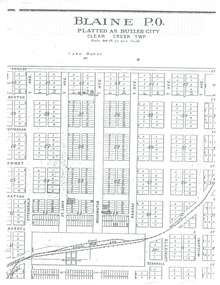Blaine, Kansas
| Blaine, Kansas | |
|---|---|
| Unincorporated community | |
 Location within Pottawatomie County and Kansas | |
| Coordinates: 39°29′48″N 96°24′11″W / 39.49667°N 96.40306°WCoordinates: 39°29′48″N 96°24′11″W / 39.49667°N 96.40306°W[1] | |
| Country | United States |
| State | Kansas |
| County | Pottawatomie |
| Founded | 1873 |
| Platted | 1879 |
| Elevation[1] | 1,506 ft (459 m) |
| Time zone | CST (UTC-6) |
| • Summer (DST) | CDT (UTC-5) |
| Area code | 785 |
| FIPS code | 20-07175 [1] |
| GNIS feature ID | 0473415 [1] |
Blaine is an unincorporated community in Pottawatomie County, Kansas, United States.[2] It is located 29 miles northeast of Manhattan at the crossroads of K-99 and K-16.
History
Blaine was initially settled by 60 Irish Catholics families in 1873.[3] The Irish emigrants came from a poor Irish neighborhood of St. Louis known as the “Kerry Patch.”

Many of the first settlers or their family members had originally immigrated to America during the Potato Famine and then slowly moved westward. The immigrants established the settlement of Butler City along Bluff Creek which served as the first settlers' main water source. Butler City was officially platted at tier 6 south, ranges 9 and 10 east on October 14, 1879; the young town's namesake was Father Thomas Ambrose Butler, an Irish Priest in St. Louis, who encouraged the original settlers to "colonize" in and around modern day Blaine. A post office was opened in Butler City in 1874 [4] Within a few years, the town’s name was changed to Blaine because another town called Butler City already existed in Kansas, which resulted in frequent mix-ups with the postal service. A railway was built a short time later. The rail line that originally ran through Blaine was built as a narrow-gauge railroad called the Kansas Central. It was standard-gauged by the Union Pacific and was finally abandoned in 1934. Another little railroad was built from Blaine seven miles south to Westmoreland called the Kansas, Southern & Gulf Railway. It was later changed to the Westmoreland Interurban Railway and used a touring car and trailer on railroad wheels to move freight. It was razed in 1915.[5] Although Irish Catholics made up the majority of Blaine and the surrounding area, these people did not exist in cultural isolation. The original Irish settlers in Blaine were joined by a few German families throughout the latter part of the 19th century. At Blaine's peak, there were approximately 200 people living in the community. Today it is around 30, a majority of whom are the descendants of the original settlers.
Demographics
Religion
Blaine is historically and to this day primarily Catholic. In 1881, the first church was completed. The church was named St. Columbkille Catholic Church and Mount Calvary cemetery was established in 1885. In 1908, a larger red brick gothic-style church was built to replace the previous church. It's Knights of Columbus Council was chartered in 1921, and remains active today. The church has remained open through parish consolidation has occurred in rural areas. Weekly Mass is still celebrated, although instead of a resident priest, the parish shares a priest with several other churches in the area.[6]
 The original wood-frame church in Butler City.
The original wood-frame church in Butler City. The earliest photograph of the still standing church in Blaine.
The earliest photograph of the still standing church in Blaine.
Education
A Catholic school was opened in 1919 and was active until 1966.[6] A storm damaged both the school and church in June 2010, the church was fixed but the school couldn't be economically repaired, so it was razed. Soon afterward, a new parish community center was built to hold social functions.[7]
References
- 1 2 3 4 Geographic Names Information System (GNIS) details for Blaine, Kansas; United States Geological Survey (USGS); October 13, 1978.
- ↑ "Pottawatomie County". Blue Skyways. Kansas State Library. Archived from the original on 19 June 2013. Retrieved 22 June 2014.
- ↑ "Fr. Thomas A. Butler". Retrieved 6 December 2014.
- ↑ "Kansas Post Offices, 1828-1961". Kansas Historical Society. Archived from the original on October 9, 2013. Retrieved 22 June 2014.
- ↑ "Kansas Ghost Towns". Retrieved 6 December 2014.
- 1 2 "Lost Kansas Communities". Chapman Center for Rural Studies. Retrieved December 6, 2014.
- ↑ Blaine Church Hall Pledge Request Letter.
External links
- Mount Calvary Cemetery at Find a Grave, located south of Blaine
- Pottawatomie County Maps: Current, Historic, KDOT
